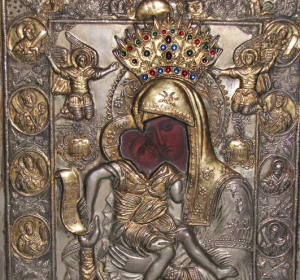What Did the Holy Fathers Believe about the “Sacraments of Heretics”?

By Bishop Philaretos of Pallini and Western Europe.
As in any such theological question, we should search the Holy Fathers.
St. Ignatius of Antioch doesn’t even foresee schismatics as inheriting the Kingdom of God when he says,
“Be not deceived, my brethren: If anyone follows a maker of schism [i.e., is a schismatic], he does not inherit the kingdom of God; if anyone walks in strange doctrine [i.e., is a heretic], he has no part in the passion [of Christ]. Take care, then, to use one Eucharist, so that whatever you do, you do according to God: For there is one flesh of our Lord Jesus Christ, and one cup in the union of his blood; one altar, as there is one bishop, with the presbytery and my fellow servants, the deacons” (Letter to the Philadelphians 3:3–4:1 [A.D. 110]).
Similarly, St. Irenaeus says,
“In the Church God has placed apostles, prophets, teachers, and every other working of the Spirit, of whom none of those are sharers who do not conform to the Church, but who defraud themselves of life by an evil mind and even worse way of acting. Where the Church is, there is the Spirit of God; where the Spirit of God is, there is the Church and all grace” (Against Heresies3:24:1 [A.D. 189]).
“[The spiritual man] shall also judge those who give rise to schisms, who are destitute of the love of God, and who look to their own special advantage rather than to the unity of the Church; and who for trifling reasons, or any kind of reason which occurs to them, cut in pieces and divide the great and glorious body of Christ, and so far as in them lies, destroy it—men who prate of peace while they give rise to war, and do in truth strain out a gnat, but swallow a camel. For they can bring about no ‘reformation’ of enough importance to compensate for the evil arising from their schism. . . . True knowledge is that which consists in the doctrine of the apostles, and the ancient constitution of the Church throughout all the world, and the distinctive manifestation of the body of Christ according to the successions of the bishops, by which they have handed down that Church which exists in every place [i.e., the Catholic Church]” (ibid., 4:33:7–8).
St. Cyprian of Carthage says,
Whoever is separated from the Church and is joined to an adulteress [a schismatic church] is separated from the promises of the Church, nor will he that forsakes the Church of Christ attain to the rewards of Christ. He is an alien, a worldling, and an enemy. He cannot have God for his Father who has not the Church for his mother” (The Unity of the Catholic Church 6, 1st ed. [A.D. 251]).
“Let them not think that the way of life or salvation exists for them if they have refused to obey the bishops and priests since the Lord says in the book of Deuteronomy: ‘And any man who has the insolence to refuse to listen to the priest or judge, whoever he may be in those days, that man shall die’ [Deut. 17:12]. And then, indeed, they were killed with the sword . . . but now the proud and insolent are killed with the sword of the Spirit when they are cast out from the Church. For they cannot live outside, since there is only one house of God, and there can be no salvation for anyone except in the Church” (Letters 61[4]:4 [A.D. 253]).
“When we say, ‘Do you believe in eternal life and the remission of sins through the holy Church?’ we mean that remission of sins is not granted except in the Church” (ibid., 69[70]:2 [A.D. 253]).
“Peter himself, showing and vindicating the unity, has commanded and warned us that we cannot be saved except by the one only baptism of the one Church. He says, ‘In the ark of Noah a few, that is, eight souls, were saved by water. Similarly, baptism will in like manner save you” [1 Peter 3:20-21]. In how short and spiritual a summary has he set forth the sacrament of unity! In that baptism of the world in which its ancient wickedness was washed away, he who was not in the ark of Noah could not be saved by water. Likewise, neither can he be saved by baptism who has not been baptized in the Church which is established in the unity of the Lord according to the sacrament of the one ark” (ibid., 73[71]:11).
“[O]utside the Church there is no Holy Spirit, sound faith moreover cannot exist, not alone among heretics, but even among those who are established in schism” (Treatise on Rebaptism 10 [A.D. 256]).
In the works of Jerome we read,
“Heretics bring sentence upon themselves since they by their own choice withdraw from the Church, a withdrawal which, since they are aware of it, constitutes damnation. Between heresy and schism, there is this difference: that heresy involves perverse doctrine, while schism separates one from the Church on account of disagreement with the bishop. Nevertheless, there is no schism which does not trump up a heresy to justify its departure from the Church” (Commentary on Titus 3:10–11 [A.D. 386]).
and likewise in Augustine,
“Just as baptism is of no profit to the man who renounces the world in words and not in deeds, so it is of no profit to him who is baptized in heresy or schism; but each of them, when he amends his ways, begins to receive profit from that which before was not profitable, but was yet already in him” (On Baptism, Against the Donatists 4:4[6] [A.D. 400]).
“I do not hesitate to put the Catholic catechumen, burning with divine love, before a baptized heretic. Even within the Catholic Church herself we put the good catechumen ahead of the wicked baptized person . . . For Cornelius, even before his baptism, was filled up with the Holy Spirit [Acts 10:44–48], while Simon [Magus], even after his baptism, was puffed up with an unclean spirit [Acts 8:13–19]” (ibid., 4:21[28]).
“The apostle Paul said, ‘As for a man that is a heretic, after admonishing him once or twice, have nothing more to do with him’ [Titus 3:10]. But those who maintain their own opinion, however false and perverted, without obstinate ill will, especially those who have not originated the error of bold presumption, but have received it from parents who had been led astray and had lapsed . . . those who seek the truth with careful industry and are ready to be corrected when they have found it, are not to be rated among heretics” (Letters 43:1 [A.D. 412]).
“Whoever is separated from this Catholic Church, by this single sin of being separated from the unity of Christ, no matter how estimable a life he may imagine he is living, shall not have life, but the wrath of God rests upon him” (ibid., 141:5).
Origen speaks of the general belief of his time when he says,
“If someone from this people wants to be saved, let him come into this house so that he may be able to attain his salvation. . . . Let no one, then, be persuaded otherwise, nor let anyone deceive himself: Outside of this house, that is, outside of the Church, no one is saved; for, if anyone should go out of it, he is guilty of his own death” (Homilies on Joshua 3:5 [A.D. 250]). “
Do heretics comprise a Church with Grace-filled Mysteries? The following excerpts are from the 4th-century dialogue “Against the Luciferians” as found in the writings of St. Hieronymus (Jerome):
(L) signifies the words of the Luciferian schismatics
(O) signifies the words of the Orthodox Christian.
Introductory word: Lucifer, in the earnestness of his anti-Arian opinion, refused to acknowledge as bishops those who had come over from Arianism, though he accepted the laymen who had been baptized by Arian bishops. This opinion led to the Luciferian schism and forms the subject of the Dialogue.
L. Are the Arians Christians or not?
O. I answer with another question, Are all heretics Christians?
L. If you call a man a heretic you deny that he is a Christian.O. No heretics, then, are Christians.L. I told you so before.
O. If they are not Christ’s, they belong to the devil.L. No one doubts that.
O. But if they belong to the devil, it makes no difference whether they are heretics or heathen.L. I do not dispute the point.
O. We are then agreed that we must speak of a heretic as we would of a heathen.L. Just so.
O. Now it is decided that heretics are heathen, put any question you please.
O. I do not deny that it is the practice of the Churches in the case of those who live far from the greater towns have been baptized by presbyters and deacons, for the bishop to visit them, and by the laying on of hands to invoke the Holy Ghost upon them. But how shall I describe your habit of applying the laws of the Church to heretics, and of exposing the virgin entrusted to you in the brothels of harlots? If a bishop lays his hands on men he lays them on those who have been baptized in the right faith, and who have believed that the Father, Son, and Holy Ghost, are three persons, but one essence. But an Arian has no faith…How can he then receive the Holy Ghost from the Church, who has not yet obtained remission of sins? For the Holy Ghost must have a clean abode: nor will He become a dweller in that temple which has not for its chief priest the true faith.L. We pardon a layman because, when he was baptized, he had a sincere impression that he was joining the Church. He believed and was baptized in accordance with his faith.
O. That is something new for a man to be made a Christian by one who is not a Christian. When he joined the Arians into what faith was he baptized? Of course into that which the Arians held. If on the other hand, we are to suppose that his own faith was correct, but that he was knowingly baptized by heretics, he does not deserve the indulgence we grant to the erring…Besides, it is the custom at baptism to ask, after the confession of faith in the Trinity, do you believe in Holy Church? Do you believe in the remission of sins? What Church do you say he believed in? The Church of the Arians? But they have no Church. In ours? But the man was not baptized into it: he could not believe in that whereof he was ignorant…The point in dispute is not merely whether a bishop is incapable of penitence and a layman capable, but whether a heretic has received valid baptism. If he has not (and this follows from your position), how can he be a penitent*, before he is a Christian? Show me that a layman coming from the Arians has valid baptism, and then I will not deny him penitence. But if he is not a Christian, if he had no priest to make him a Christian, how can he do penance when he is not yet a believer? *In the church of the Romans the place of penitents is exposed to view … so there penitents stand downcast and mournful, and after the Divine Liturgy is over the poor wretches — instead of partaking of communion — fall to the ground upon their faces with much sobbing and wailing. From the other direction, the Bishop comes running, and he too likewise falls to the ground weeping tears and uttering laments, and along with them the entire congregation bursts out crying and shedding copious tears. Afterward, the Bishop is the first to rise up from the ground and stand up, and he raises the penitents, and after praying aloud to God on account of their sins, he dismissed them and they go their way. (Note: A person must be a member of the Church/baptized in order to be a penitent.)\
L. Does it seem right to you that an Arian should be a bishop?
O. You prove him a bishop because you receive those he has baptized. And it is here that you are to blame…
O. Cyprian of blessed memory tried to avoid broken cisterns and not to drink of strange waters: and therefore, rejecting heretical baptism, he summoned his African synod in opposition to Stephen, who was the blessed Peter’s twenty-second successor in the see of Rome. They met to discuss this matter, but the attempt failed. At last, those very bishops who had together with him determined that heretics must be re-baptized, reverted to the old custom, and published a fresh decree.
O. I will tell you my opinion briefly and without reserve. We ought to remain in that Church which was founded by the Apostles and continues to this day. If ever you hear of any that are called Christians taking their name not from the Lord Jesus Christ, but from some other, for instance, Marcionites, Valentinians, Men of the mountain or the plain, you may be sure that you have there not the Church of Christ, but the synagogue of Antichrist. The fact that they took their rise after the foundation of the Church is proof that they are those whose coming the Apostle foretold. And let them not flatter themselves if they think they have Scripture authority for their assertions since the devil himself quoted Scripture, and the essence of the Scriptures is not the letter, but the meaning. Otherwise, if we follow the letter, we too can concoct a new dogma and assert that such persons as wear shoes and have two coats must not be received into the Church.






